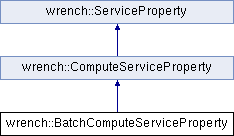|
| static const std::string | BATCH_QUEUE_ORDERING_ALGORITHM |
| | The batch_standard_and_pilot_jobs queue ordering algorithm. Can be: More...
|
| |
|
static const std::string | BATCH_RJMS_PADDING_DELAY |
| | Integral number of seconds that the Batch Scheduler adds to the runtime of each incoming job. This is something production batch_standard_and_pilot_jobs systems do to avoid too aggressive job terminations. For instance, if a job says it wants to run for (at most) 60 seconds, the system will actually assume the job wants to run for (at most) 60 + 5 seconds.
|
| |
| static const std::string | BATCH_SCHEDULING_ALGORITHM |
| | The batch_standard_and_pilot_jobs scheduling algorithm. Can be: More...
|
| |
| static const std::string | BATSCHED_CONTIGUOUS_ALLOCATION |
| | Controls Batsched node allocation policy. More...
|
| |
| static const std::string | BATSCHED_LOGGING_MUTED |
| | Controls Batsched logging. More...
|
| |
| static const std::string | HOST_SELECTION_ALGORITHM |
| | The host selection algorithm. Can be: More...
|
| |
| static const std::string | IGNORE_INVALID_JOBS_IN_WORKLOAD_TRACE_FILE |
| | Whether, when simulating a workload trace file, to abort when there is an invalid job specification (e.g., negative times, negative allocations), or to simply print a warning. More...
|
| |
| static const std::string | OUTPUT_CSV_JOB_LOG |
| | Path to a to-be-generated Batsim-style CSV trace file (e.g. for b3atch schedule visualization purposes). More...
|
| |
| static const std::string | SIMULATE_COMPUTATION_AS_SLEEP |
| | Simulate computation as just a sleep instead of an actual compute thread. This is for scalability reason, and only simulation-valid if one is sure that cores are space shared (i.e., only a single compute thread can ever run on a core at once). Since space-sharing at the core level is typically the case in batch_standard_and_pilot_jobs-scheduled clusters, this is likely fine. More...
|
| |
|
static const std::string | SIMULATED_WORKLOAD_TRACE_FILE |
| | Path to a workload trace file to be replayed. The trace file can be be in the SWF format (see http://www.cs.huji.ac.il/labs/parallel/workload/swf.html), in which case it must have extension ".swf", or in the JSON format as used in the BATSIM project (see https://github.com/oar-team/batsim), in which case is must have the ".json" extension). The jobs in the trace whose node/host/processor/core requirements exceed the capacity of the batch_standard_and_pilot_jobs service will simply be capped at that capacity. Job submission times in the trace files are relative to the batch_standard_and_pilot_jobs's start time (i.e., all jobs in the trace files will be replayed assuming that the batch_standard_and_pilot_jobs starts at time zero). Note that in the BATSIM JSON format, the trace does not contains requested vs. actual trace runtimes, and to all requested runtimes are 100% accurate.
|
| |
| static const std::string | SUBMIT_TIME_OF_FIRST_JOB_IN_WORKLOAD_TRACE_FILE |
| | A specification of the submit time of the first job in a provided trace file. More...
|
| |
| static const std::string | TASK_SELECTION_ALGORITHM |
| | The algorithm to pick which ready computational task (within a standard job executed by the batch_standard_and_pilot_jobs service), in case multiple tasks are ready, should run first. This is typically not managed by a batch_standard_and_pilot_jobs scheduler, but by some application-level script that executes a set of tasks within compute resources allocated by the batch_standard_and_pilot_jobs scheduler. Possible values are: More...
|
| |
|
static const std::string | TASK_STARTUP_OVERHEAD |
| | The overhead to start a task execution, in seconds.
|
| |
| static const std::string | USE_REAL_RUNTIMES_AS_REQUESTED_RUNTIMES_IN_WORKLOAD_TRACE_FILE |
| | Whether, when simulating a workload trace file, to use the actual runtimes as requested runtimes (i.e., simulating users who request exactly what they need) or not (i.e., simulating users who always overestimate what they need, which is typical in the real world): More...
|
| |
Configurable properties for a BatchComputeService.


